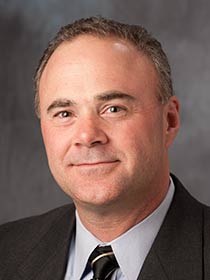The View From the Top
 Appointed executive director of the Society for Human Resource Management Foundation last fall, his new position places Mark Schmit ’90 at the helm of the fundraising and educational arm of the national organization for human resource professionals. Previously Schmit served the foundation’s parent organization as vice president of research, providing strategic leadership for the society’s survey and research programs. Before joining SHRM, he was western regional vice president at APTMetrics in Denver. Schmit earned his doctorate and master’s degrees in industrial and organizational psychology from Bowling Green State University after majoring in psychology at St. Norbert. Speaking here with our contributor Paul Nicolaus ’05, Schmit reflects on the current research agenda for the profession of human resources.
Appointed executive director of the Society for Human Resource Management Foundation last fall, his new position places Mark Schmit ’90 at the helm of the fundraising and educational arm of the national organization for human resource professionals. Previously Schmit served the foundation’s parent organization as vice president of research, providing strategic leadership for the society’s survey and research programs. Before joining SHRM, he was western regional vice president at APTMetrics in Denver. Schmit earned his doctorate and master’s degrees in industrial and organizational psychology from Bowling Green State University after majoring in psychology at St. Norbert. Speaking here with our contributor Paul Nicolaus ’05, Schmit reflects on the current research agenda for the profession of human resources.
Q: At its core human resources is about …
A: … It’s about helping organizations put in place people-management strategies that positively impact both the business and the people in the organization.
Q: How would you describe the Society for Human Resource Management and its foundation?
A: The Society for Human Resource Management (SHRM) is a membership organization for people who are in HR, and we provide educational experiences for them as well as content and resources to help them do their job. We are also an advocate: We represent the profession both in a governmental kind of an arena but also from a public relations standpoint.
Q: What is the foundation’s role?
A: The SHRM Foundation is a subsidiary or an affiliate of SHRM, and we are the nonprofit charity arm, so in other words we can accept tax-deductible donations, and we use that money then to fund HR research. Generally, it’s academics who make proposals to us. We help identify the kind of needs for HR, we build a research agenda around that, and then we find academic researchers who are pursuing studies in those areas so that the tools and solutions HR people are going to need five or 10 years from now are ready when those issues hit. The other thing we do is we give scholarships, so helping fund undergraduate and graduate students as well as professional certification.
Q: So the foundation serves as a catalyst?
A: I believe that the foundation is on a solid path to being among the most preeminent thought-leader organizations in the field of HR. Right now we’re doing a major project with The Economist Intelligence Unit; they are a subsidiary of The Economist magazine, a publishing group. Really what they have access to is a panel of over 100,000 C-suite executives – CEOs and CFOs and so forth – from around the world, and we can tap into this panel to understand what the coming business issues are … . As a profession we tend to have a limited view of that top because we’re seeing it from the HR perspective only, but this study that we’re doing with them will help us see it not only from the HR perspective but from the perspective of executives around the world. We also work with academic institutes and consulting firms to help educate them on what are the coming issues so that they, too, can start to invest in the future. In that way we are the catalyst behind multiple streams of solutions for HR folks. Whether it’s through academics or through consulting firms, think tanks, you name it, we try to drive our research agenda through all of those avenues. That way everybody is working on the same problems and we come up with different perspectives and different solutions for those problems.
Q: What’s next?
A: I think that the most exciting thing for me is the project that we’re doing with The Economist Intelligence Unit to identify future business trends that will impact talent-management kinds of programs. The reason that is exciting to me is that we’re being very proactive about that in order to try to set up solutions well in advance of the need for HR folks, and for me that’s something where we can have an impact, and can leave a legacy because of that impact. We have the funds to be able to do that, and we have the people to be able to do that.
Nov. 19, 2013











